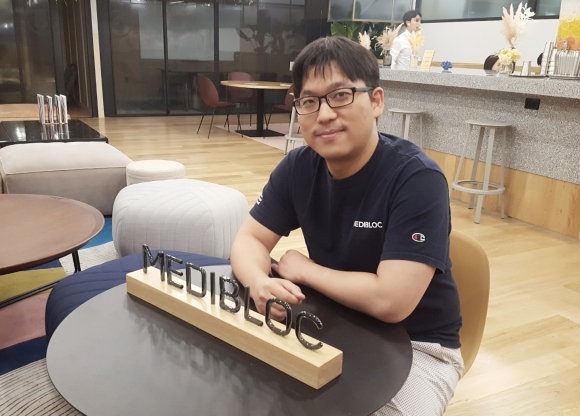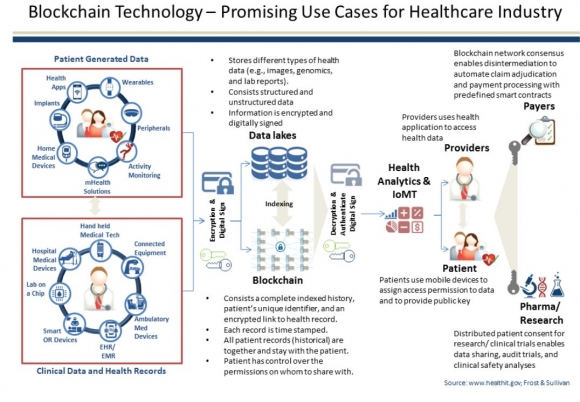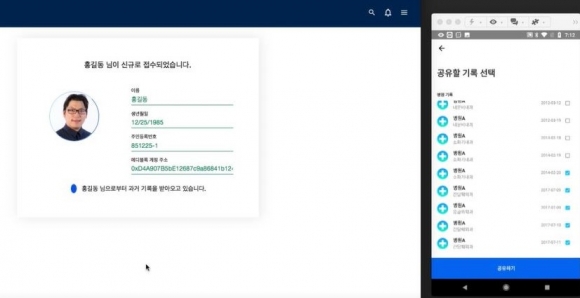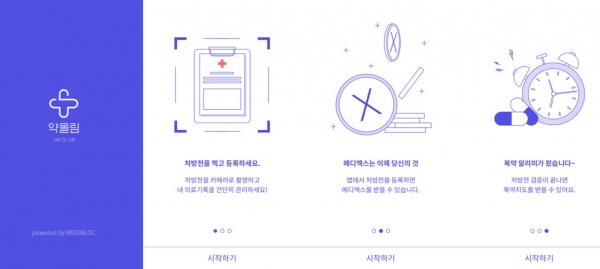탐방
MediBloc, a blockchain-based PHR(personal health records) platform
by Euna Lee
Founded in April 2017, the company has procured the integrity and security of medical records through blockchain technology. The team has successfully demonstrated PoC of its platform and is currently developing a commercial version of it.
MediBloc is a decentralized platform for personal health records (PHR) built on blockchain, where individual patients become the medium of data flow and exchange and utilize their PHR as needed. MediBloc is the first company to apply the technology to medical field, which has been primarily used in financial transactions and retail and distribution industry.
It was the unique background of the co-founders that played an important role in their decision to use blockchain technology for managing personal medical information. Dr. Eunsol Lee and Dr. Allen Wookyun Kho are both professional doctors with IT expertise.
Dr. Lee is a radiologist with great interest in IT, which led him to enroll into Seoul Science High School as a programming specialist. During his medical training, he continued his research on quantitative data analysis and video artificial intelligence, which he received awards on. Dr. Kho is a graduate of KAIST with a bachelor’s degree in computer science and furthered his study at Columbia University’s master of computer science program. He joined Samsung Electronics as a software engineer, and later went to Kyung Hee University College & School of Dentistry and became a dental surgeon with engineering background.
As the first mover of medical blockchain industry, MediBloc also has competitive advantages in which the co-founders have complete understanding and expertise of both healthcare and IT industries.

▲이은솔 메디블록 공동대표
Last year, MediBloc raised approximately 12 billion Korean Won (the value of ICO at the time) through ICO(Initial Coin Offering) and is currently planning to attract institutional investment.
◇ A patient-centered healthcare ecosystem powered by blockchain
The company’s goal is to create a patient-patient-centric healthcare ecosystem powered by blockchain technology. The team is developing a decentralized platform for personal health data by proving the integrity of patient data through the technology.
Blockchain is a technology which records and jointly manages ledgers containing specific information on a decentralized peer-to-peer (P2P) network, instead of centralized server. It can be seen as blocks of data that are linked together in the form of a chain.
Blockchain technology can turn a ‘centralized PHR model’ into a ‘patient-centered PHR model’. In the past, medical institutions, such as hospitals, have created and controlled medical data of their patients, but blockchain technology enables individual patients to manage, utilize, and exchange their data with medical institutions, insurers, and pharmaceuticals, with out any central institution to supervise the process. By proving the integrity of data, blockchain technology can enable and become the foundation of an healthcare ecosystem that is centered around patients where they enjoy the ownership of their personal data.

▲헬스케어 산업에서 블록체인 기술의 활용 모식도(출처: www.healthit.gov, Frost & Sullivan 자료)
According to Dr. Lee, the key aspect of the platform is that individual patients can store their personal medical data in their smartphone and use it whenever needed. Patients can download their medical data from hospitals, share it with a third party (medical institution, pharmaceutical companies, research centers, insurance companies, etc.), and save costs otherwise would have incurred from repeated medical examinations. Patients no longer have to concerned with potential data omission caused by a change of hospital or doctor, as all medical information is accessible through one platform, MediBloc. Patients who provide their patient data—without any private information—for research purposes will be rewarded with its service and cryptocurrency.
Medical institutions and healthcare providers also benefit from the service as they are able to better diagnose patients with complete indexed medical history of patients, along with their lifelong data. Insurers can also streamline their process for claims as there is no need to double-check data that is provided by patients. The same applies to pharmaceutical companies and other medical institutions. The platform will accelerate development and growth of customized healthcare services.
The most promising area is ‘new drug development’. Currently, pharmaceutical companies have access to patients’ medical information when performing joint research with a medical institution and/or related companies. This is the reason why Roche acquired ‘Flatiron Health' for 1.9 billion dollars (approximately 2.12 trillion Korean Won) last February. Flatiron Health developed a cloud platform and service for the analysis/integration of clinical information on cancer patients based on their electronic health records (EHR). As the company develops new drugs, Roche’s focus is on real-world data which is being used by the regulatory authorities for drug evaluation.
Dr. Lee said, “Blockchain allows pharmaceutical companies to easily access and utilize patients’ medical information. By doing so, new approaches can be taken in terms of patient recruitment in clinical trials, understanding of drug interaction and its characteristics, and assessment of potential impact on patient safety when developing a new drug.”
◇ How far has MediBloc platform gotten?
During the first half of the year, MediBloc conducted PoC(proof of concept) to verify whether patient data can be exchanged between medical institutions. With smartphones, virtual data of patients created by Seoul National University Hospital were transferred to Seoul National University Bundang Hospital. For convenience of user, the team used QR to connect these hospitals and exchange data. Lifelog data created outside hospitals could also be transferred.

▲의료기관 간의 환자 데이터 교류 여부를 확인하는 개념증명(Proof of Concept, PoC) 작업 (메디블록 제공)
MediBloc is now developing a commercial version of the platform. It is planning a project in which actual patient data are transferred from medical institutions (Seoul National University Hospital, Seoul Medical Center, Seoul St. Mary’s Hospital) to patients, and data provided by patients are used for clinical trials. MediBloc also signed strategic partnership agreements with Hanyang University Medical Center, Kyung Hee Dental Hospital, and Bestian Foundation to conduct joint research.
Since last July, MediBloc has been executing an empirical study on the distribution of medical data with blockchain technology. Dr. Lee also mentioned that MediBloc is conducting a research with Massachusetts General Hospital of Harvard Medical School to verify the blockchain-based platform.

▲메디블록이 출시예정인 첫번째 애플리케이션 '약올림' (홈페이지 제공)
Within this year, MediBloc will also release its first application, “Yakolim”. Yakolim is a service that allows patients to own and manage information of their prescriptions. Patients are rewarded with token (MEDX) when they upload a picture of their prescription on the app. Users will be able to directly sell their data to pharmaceutical and insurance companies for research purposes.
Currently, MediBloc is operating its own testnet as the team came to the conclusion that MediBloc must have complete control over the blockchain core and its service in order to create a platform that is optimized for managing and exchanging medical information. By having its own blockchain platform, MediBloc team expects to improve flexibility, increase data throughput and processing speed, cut transaction costs, and promote interoperability with other projects. The beta version of the platform was released in August, and the commercial version will be launched early next year. A library for integration of the service app and blockchain is also under development.
Dr. Lee said, “Once we overcome the current obstacles, blockchain technology will bring us the greatest innovation in the healthcare industry. We will create a platform where individual patients are empowered to manage their own medical information. It will be a new paradigm in the industry.”



















